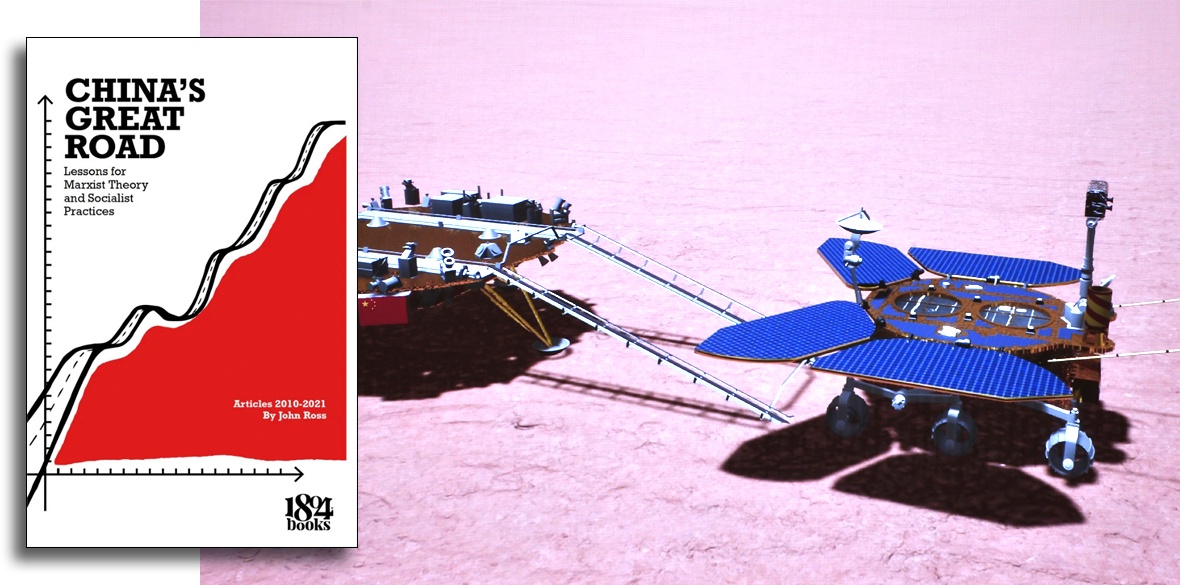This is the last article you can read this month
You can read more article this month
You can read more articles this month
Sorry your limit is up for this month
Reset on:
Please help support the Morning Star by subscribing here
China’s Great Road: Lessons for Marxist Theory and Socialist Practices
by John Ross
(Praxis Press, £15)
IN THE 71 years since the founding of the People’s Republic on October 1, 1949, China has gone from being one of the poorest countries in the world, with the vast bulk of the population enduring abject poverty, to the brink of becoming a high-income country which has achieved total elimination of absolute poverty and the world’s fastest rise in average living standards.
Such is the human reality behind the abstract notion of China’s rise. The country’s life expectancy in 1949 was around 35, now it is 77. Illiteracy, malnutrition and homelessness were endemic, now they have been eliminated.
In his book, John Ross makes it very clear that China’s successes are those of socialism. Yet Western economists have long insisted that any “China miracle” exists within a framework of capitalism. In this version of events, China dropped socialism in the late 1970s, adopted capitalism and let the neoliberal magic do its work.
The reasons for ascribing China’s rise to capitalist economics are clear enough for Ross: “If it acknowledged that the socialist path of development was proven to be superior to capitalism, then the Western system would lose its legitimacy both internationally and domestically.”
But what the Western narrative cannot explain is how China in the pre-reform period was able to achieve unprecedented progress in every area of life. From 1949 to 1978, life expectancy increased by more than a year for every chronological year that passed, reaching 67 at the time of Mao’s death in 1976.
Education and healthcare were extended throughout the country. People were poor but everybody had food, clothing and a roof over their heads — no small feat for an enormous developing country recovering from a century of imperialist domination.
Although the reform period from 1978 marked a significant break with the highly egalitarian policies of the Mao era, an analysis of the structure of the modern Chinese economy reveals that it is fundamentally different from capitalism. As Xi Jinping put it in 2019: “Socialism with Chinese characteristics is socialism, not any other ism.”
Even with the huge quantities of private capital and the presence of foreign investment and the existence of stock exchanges and billionaires, the Chinese government maintains a dominant role in the economy via its ownership of the major banks and state-owned enterprises. Planning continues to be a core element of the economic system.
Deng Xiaoping’s theoretical innovation was to define China’s stage of development as being that of the primary, underdeveloped stage of socialism. Progress towards a more advanced stage of socialism necessitated development of the productive forces.
This required an influx of capital and it required learning from the technical developments of the advanced capitalist countries. This in turn meant attracting foreign investment and opening to an increasingly globalised market.
As Ross points out, Deng’s strategy was in line with Marx, who wrote in the Critique of the Gotha Programme that “in a higher phase of communist society... after the productive forces have also increased with the all-around development of the individual and all the springs of common wealth flow more abundantly — only then can the narrow horizon of bourgeois right be crossed in its entirety and society inscribe on its banners: ‘From each according to his abilities, to each according to his needs’.”
Ross explains that the state-driven nature of the economy allowed China to successfully ride the wave of the 2007-09 financial crisis. Currently, it is enabling China to lead the way in containing the pandemic and combating climate change.
Socialist countries led by China are responsible for the bulk of global GDP growth and poverty alleviation in recent decades. They have developed a state-driven mixed-economy model which provides an attractive alternative to the so-called Washington Consensus free-market dogma and they provide a crucial source of investment and trade for the entire global South.
As such, the world has a huge amount to learn from China, and a huge amount to benefit from continued engagement with it.
Agnes Smedley’s biography of Zhu De, The Great Road, provided an indispensable insight into the development of the Chinese Revolution in the 1930s. Similarly, Ross’s book provides an indispensable insight into the ongoing development of the Chinese Revolution in the modern era.











